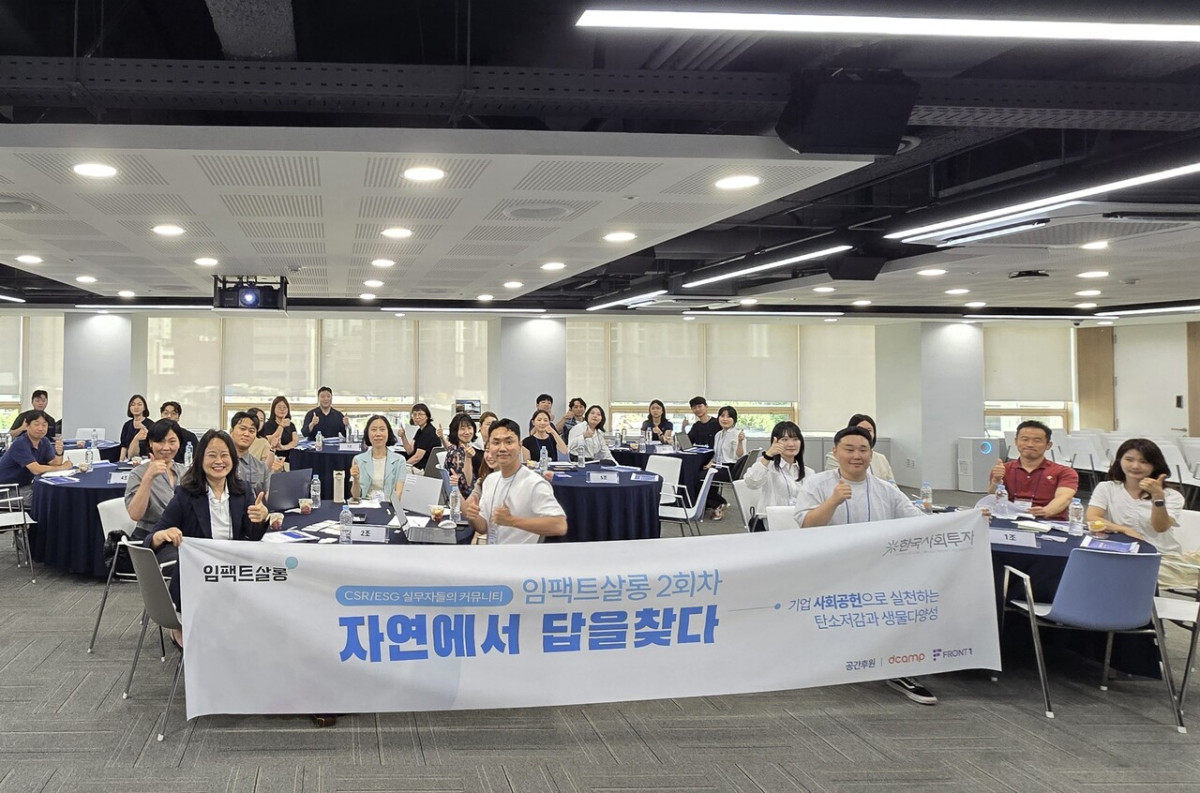Korea Social Investment Successfully Concludes the 2nd Session of "Impact Salon" for ESG Practitioners

본문
Participants of the second session of Impact Salon pose for a group photo. / Photo = Korea Social Investment
Eroun.net = Editor Soo-jin Lee
The public interest foundation Korea Social Investment announced on the 16th that it held the second session of the "IMPACT SALON" for corporate CSR and ESG practitioners on the 9th at Front1 in Gongdeok-dong, Mapo-gu, Seoul.
The event, under the theme “Finding Answers in Nature: Carbon Reduction and Biodiversity through Corporate Social Contribution,” shared how companies and startups can collaborate to implement Nature-based Solutions (NbS). ESG and CSR managers from 31 companies attended the event.
The program included opening remarks by Lee Soon-yeol, CEO of Korea Social Investment, a keynote speech by Myung Soo-jung, Senior Research Fellow at the Korea Environment Institute, a case presentation from SK Innovation, and technology showcases from three startups: ThanksCarbon, InvaLab, and ForNatures.
Myung Soo-jung, Senior Research Fellow at the Korea Environment Institute, emphasized that “Achieving both carbon neutrality and full biodiversity recovery by 2050—the ‘Nature Positive’ strategy—is becoming a global standard,” and added, “As TCFD expands to TNFD, companies are increasingly expected to disclose information related to natural capital.”
She also suggested practical approaches tailored to the domestic context: “Globally, bee populations are disappearing, but urban areas are often more favorable environments for bees than rural ones. Urban beekeeping through the planting of nectar-producing plants or restoring disappearing wetlands are effective activities companies can start immediately.”
A notable presentation came from a large corporation demonstrating structured biodiversity management. Seo-yeon Lee, PM at SK Innovation, introduced the company’s biodiversity management system at its Ulsan Complex using the globally recognized LEAP approach.
She explained, “After a detailed survey of 9,819 individual birds across 106 species—including 15 nationally protected species in Ulsan—we created a habitat for raptors, which are top predators,” adding, “Creating an environment for umbrella species like raptors can restore entire ecosystems.” SK Innovation installed artificial nests and feeding stations over a 1,000㎡ area, and is currently tracking the movements of two rescued eagle owls using GPS to gather scientific evidence in real time.
The most attention-grabbing part of the event was the innovative technologies presented by startups that already have collaborative records with large corporations.
Hae-won Kim, CEO of ThanksCarbon, introduced a "digital MRV (Measurement, Reporting, Verification) technology that reduces methane emissions from Asia’s largest rice paddies using satellite data." He stated, “We are currently advancing a large-scale project covering 200,000 hectares in Vietnam, Cambodia, and Bangladesh.” He also shared a seagrass habitat restoration project in the Yeosu coastal area, which has been ongoing for four years in partnership with LG Chem.
Won-hyeop Shin, CEO of InvaLab, presented a solution in response to the surge in wildfire damage this year. “The area affected by wildfires has more than doubled compared to last year, leading to a sharp increase in demand for restoration on steep slopes where human access is limited,” he explained. “Our key technology integrates drones and seed balls to analyze competitive dynamics with invasive species and construct the desired ecological structures.”
Ho-rim Ryu, CEO of ForNatures, introduced a biological carbon capture system, stating, “Microalgae can capture more than five times the amount of carbon compared to forests in the same area, while also purifying the air.” He added that the solution is gaining attention as a response to the mandatory implementation of zero-energy buildings.
Participants said, “It was valuable to learn about specific cases from potential collaborators,” and “We were introduced to innovative technologies that we hadn’t encountered in other programs.” During the networking session, many noted, “It was helpful to see various industries come together to share ESG challenges and seek practical solutions.”
Lee Soon-yeol, CEO of Korea Social Investment, emphasized, “The core value of this event was to offer practical solutions that reflect both global trends and the Korean context in biodiversity,” and added, “We will continue to support ESG practitioners by serving as a platform that connects innovative startups with companies pursuing social value, while strengthening collaboration and field capabilities.”
Meanwhile, Impact Salon is a bi-monthly program designed to enhance the field expertise of corporate ESG and CSR professionals and to foster collaboration opportunities. Each session is built around a key ESG or CSR topic and features expert lectures, corporate case studies, and networking sessions.
Korea Social Investment is Korea’s leading ESG and CSR-focused impact public-interest organization. It plans and executes strategic social contribution and ESG initiatives for a sustainable future. Working with a global network of over 1,200 partners, it runs innovative ESG projects across climate change response, inclusive technology dissemination, and empowerment of youth, women, and seniors.
From customized consulting and ESG startup investments to its proprietary ESG evaluation model ESG Plus, Korea Social Investment provides integrated solutions. It has established itself as a trusted ESG partner by transparently managing and reporting outcomes through a precise impact measurement system.
Source : https://www.eroun.net/news/articleView.html?idxno=59602




